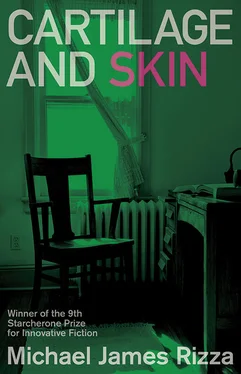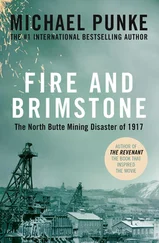Perhaps it was no use even to bother guessing.
Now that I was showered, I needed deodorant and maybe a fresh set of clothes, so I could present myself to Vanessa. Walking forward with my head lowered against the cold and my hands thrust into the pockets of the muddy-green jacket, I began to make mental calculations, trying to figure out how much money I had spent, how much I had left, and how much would be required in order to set myself up anew. Not only did I have to eat, but I also needed a ticket out of the city and at least a month’s worth of rent. Once I was situated in a new apartment, in another place, I would have to find a job. Because I could no longer rely on Morris the man, I needed to sustain myself until my next paycheck from a job I had yet to procure. Thankfully, the cost of living was exorbitant in the city, which meant my returned security deposit would go further elsewhere, particularly in the outskirts of a rural town. A part of me had a secret wish that Vanessa Somerset would accompany me and we could pool together our resources and start our lives afresh in a warm, cozy room, scented by candles.
An old man with a crooked spine was on the sidewalk, sprinkling salt on a patch of ice. He cocked his head to look at me and then smiled, stretching his mouth into a long slit, his lips the same ashen color as his flesh.
“Watch your step,” he said.
“Thanks,” I responded, lowering my eyes from his bulbous, carbuncled nose to the slick sidewalk.
“The weather’s a bitch.”
“Yes,” I said.
He threw a handful of salt before my feet.
“Thanks,” I said again, still with my eyes averted. “Is there a pharmacy or supermarket around here?”
“Two blocks that way, make a right. Then three more down.”
I sensed him pointing as he spoke, so I stole a glance at him, hesitant about getting another glimpse of his ugly nose.
He was looking off down the street.
“It’s on the left. You can’t miss it,” he said, and when he started to raise his chin and turn his head back toward me, I saw a wattle of loose skin, cinched in his neck collar, begin to pull out and stretch like a deflated balloon.
“I appreciate it,” I said, my feet crunching on the sidewalk as I stepped away.
“Happy holidays,” the man said.
“Thanks. You too.”
His kind words started me thinking about my mother and how every year around this time she would mail me a present, usually a card with money in it. She had her own way of celebrating the holidays. With a few old biddies from her church — mostly widows and spinsters — she would take a tropical vacation, at sun-baked resorts or aboard Caribbean cruises. The ritual was a nice way for the ladies to stave off the loneliness of the season. My mother had decided to join the group when I had made my formal repudiation of all things religious, which included the gelatinous cranberry sauce and lumpy mashed potatoes that each year decked my wizened aunt’s dining room table, surrounded by several plump cousins and any recent additions that currently occupied their lives, from plump girlfriends and pregnant wives to wailing cherubs and small, toddling creatures plumping — plop — onto their bottoms. Any day now, my mother was going to call my apartment to inform me of the details of her imminent vacation and try to fish out of me any hopeful developments in my life. As far as she knew, I was still attempting to regain my social status by allowing Morris the man to help me reestablish myself. Although she was generally acquainted with the events that had driven me to take a new apartment in the first place, she knew nothing about the boy or what had followed his intrusion into my life, and she would have been surprised to learn that I was quitting my apartment so soon — unless, of course, Dr. Ferguson and the black man had questioned her about me. I had no reason to doubt the thoroughness of their investigation, but fretting over it now seemed pointless, not only because I was going to leave it all behind but also because the details no longer seemed to matter. I still hadn’t decided whether I was going to contact my mother after I’d moved away or whether I was going to sever myself completely from the past. After all, I believed that I understood the real reason behind my mother’s annual sojourn; it wasn’t just to fight loneliness but rather to drown out her memories. She was still haunted by her previous life, and so for her, all the festive carols, the twinkling lights, and the holiday cheer wasn’t so much the commemoration of a religious event as it was anniversary of my father’s death. My father’s letter remained hidden in the picture frame. I had carried it with me for so many years — back when the author of “Footprints” had still remained anonymous — that I now experienced an unexpected sense of remorse at the idea of leaving it behind. Moreover, the possibility of anyone else ever reading the letter was a little unsettling. If the quaint poem in the gilded frame could survive the grubby claws of my landlord, then it might eventually end up on a shelf in a novelty shop or in a cardboard box at a sidewalk sale, with a little, round sticker on the glass, pricing it at seventy-five cents. From there, it would change hands, and if fortune, chance, or the random flux of events heaved and humped in a certain way, then maybe the frame would remain intact, placed upon someone’s end table or mounted to a kitchen wall. But ages from now, the poem might fail to stir up the proper religious affections, and the owner of the frame could possibly be moved to exchange the poem for something more sentimental and personal, such as a snapshot of her dog stretched out long, supine, and white-bellied in the grass. And then, in pieces upon her coffee table, the pretty picture frame would un-house its secret, the fading letters slanting across the stiff, yellowed sheet of paper: Don’t try to understand because I don’t even understand it myself. Don’t even bother mourning. Just be as happy as you can . Of course, the picture of the dog sunning itself would still go inside the frame, but meanwhile, my father’s letter would get passed around a circle of friends, relatives, and casual acquaintances, from fellow employees in the cafeteria to neighbors in the hall. What an intriguing little note; what a mystery, they would say, but the poor child with hair as filthy as a rat’s nest, hopefully he grew up as happy as he could and died peacefully in his sleep at a ripe old age, survived by many loved ones who all smile warmly at his memory.
Although I had a sudden desire to have the letter back in my possession, I warned myself about the possible threats lurking around my apartment. Now, to some degree, I was in hiding, and it was best to stick to my original plan.
Inside the pharmacy, I found the deodorant right away, yet I roamed the brightly lit aisles, not looking for anything in particular. Rummaging through an array of candy on a table by the front counter, some type of squat creature sidled back and forth, all bundled up with the hood of its coat nearly cinched closed at its face. I walked up one aisle and then down another, and the globule remained stooped over the table, obstructing my passageway with its broad, high bottom.
“Excuse me,” I said.
The creature gathered its body closer to the table, but there was little room to pass. Rather than try to squeeze by and risk rubbing up against the bloated thing, I retreated back down the aisle.
“That’s okay,” I said.
Glancing over my shoulder, I suddenly felt vaguely uneasy about the body, as though its shape were in some way advising me to be on guard.
On a shelf at face height was underwear, white cotton briefs and tee-shirts wrapped in clear plastic. Thinking that I ought to put on a fresh pair of briefs, I selected a three-pack, which was the smallest quantity. I could stuff the other two in my pocket.
Читать дальше












